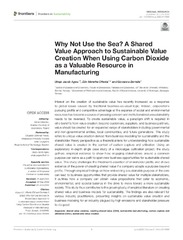Why Not Use the Sea? A Shared Value Approach to Sustainable Value Creation When Using Carbon Dioxide as a Valuable Resource in Manufacturing
Permanent link
https://hdl.handle.net/10037/26271View/
Published version (PDF)
Published version (PDF)
Date
2022-06-20Type
Journal articleTidsskriftartikkel
Peer reviewed
Abstract
Interest on the creation of sustainable value has recently increased as a response to global issues caused by traditional business-as-usual logic. Indeed, corporations pursuing profits and competitive advantage at the expense of social and environmental resources has become a source of pressing concern and institutionalized unsustainability needs to be reversed. To create sustainable value, a paradigm shift is required in who benefits from value creation: beyond customers, suppliers, and business partners, value should be created for an expanded range of stakeholders including governmental and non-governmental entities, local communities, and future generations. This study refers to unique value creation derived from business modeling for sustainability and the stakeholder theory perspective as a theoretical lens for understanding how sustainable shared value is created in the context of carbon capture and utilization. Using an exploratory, in-depth single case study of a microalgae cultivation project, the study gathers empirical evidence to show how engaging stakeholders around a common purpose can serve as a path to open new business opportunities for sustainable shared value. This study challenges the Friedman's assertion of shareholder profits and shows evidence of the power of creating shared value if a company adopts a purpose beyond profits. Through empirical findings on how embedding a sustainable purpose at the core can lead to business opportunities that provide shared value for multiple stakeholders, it outlines how a company can obtain value propositions that cater to economic, environmental, and societal balance in the drive to move toward a more sustainable society. This study thus contributes to the growing body of empirical literature on creating shared value and business models for sustainability. The findings are also relevant for various industry practitioners, presenting insights on sustainable value creation and business modeling for an industry plagued by high emissions and stakeholder pressure to do good.
Publisher
Frontiers MediaCitation
Agwu A, Oftedal EM, Bertella G. Why Not Use the Sea? A Shared Value Approach to Sustainable Value Creation When Using Carbon Dioxide as a Valuable Resource in Manufacturing. Frontiers in Sustainability. 2022;3Metadata
Show full item recordCollections
Copyright 2022 The Author(s)


 English
English norsk
norsk